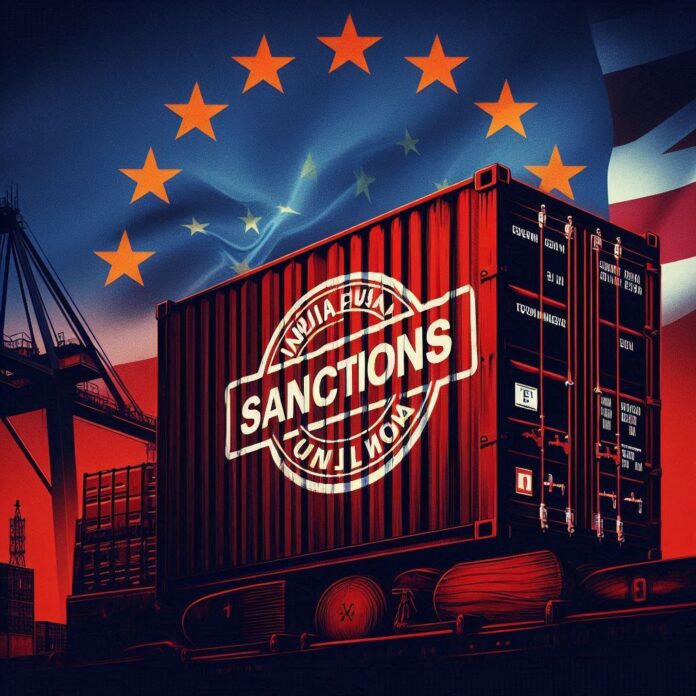The European Union (EU) and the United Kingdom (U.K.) have introduced a new set of strict sanctions aimed at Russia and those who continue to do business with it. This move comes on the third anniversary of Russia’s invasion of Ukraine and is meant to weaken the Russian military’s ability to function.
Among those affected are companies from various countries, including India. A total of four Indian firms have now been added to the EU’s sanctions list, while another Indian company has been named in the U.K.’s sanctions list. These companies are being accused of helping Russia either by supplying key materials or by assisting in avoiding sanctions.
Indian Companies on the EU Sanctions List
The latest round of EU sanctions includes 83 new individual listings—48 people and 35 businesses. Additionally, the EU has cracked down on Russia’s so-called “shadow fleet,” a group of vessels that secretly move Russian oil.
A total of 74 ships have been sanctioned, along with 53 more companies suspected of helping Russia’s military industry. These entities are based in different countries, including China, Kazakhstan, the United Arab Emirates (UAE), Uzbekistan, Türkiye, and Singapore.
Hungary’s Bold Resistance: Delaying EU Sanctions Amid U.S.-Russia Talks
India has four companies on the EU’s sanctions list, with one of them being newly added. The latest Indian entity to face sanctions is Pratik Corporation, a Mumbai-based company. The firm specializes in making products for automobiles and industrial applications. The EU has decided to freeze its assets and prevent European businesses from dealing with it. These sanctions against Pratik Corporation will take effect from February 25, 2025.
Apart from Pratik Corporation, three other Indian companies had already been placed on the EU’s sanctions list in previous rounds:
- Innovio Ventures (sanctioned on June 25, 2024)
- Triac Electronics (sanctioned on December 17, 2024)
- Si2 Microsystems Pvt Ltd (sanctioned on February 23, 2024)
These companies were accused of playing a role in helping Russia obtain restricted goods that could be used for military purposes.
U.K. Targets Indian Firm in Latest Round of Sanctions
In a separate move, the U.K. has imposed its own set of sanctions on 107 new entities that are believed to be assisting Russia. These include companies producing high-tech goods that can be used in weapons systems.
One Indian company has been named in the U.K. sanctions list: Inussia Impex Private Limited. The British government described the firm as an “India-based company that has exported Common High Priority goods, including western-produced microelectronics, to Russia.” These microelectronics are essential components for advanced military equipment and weapons.
Crackdown on Kremlin Elites: UK Bars Russian Oligarchs Under New Sanctions
For the first time, the U.K. has also included non-Russian banks in its sanctions. One of the major financial institutions targeted is OJSC Keremet Bank in Kyrgyzstan. The U.K. has expanded its list of individuals and businesses that, according to them, have ties to the Russian government and are benefitting from the ongoing war.
Sanctions Aim to Cut Support for Russia’s War Effort
With this latest wave of sanctions, both the EU and the U.K. are sending a strong message to businesses worldwide: any entity found supporting Russia’s military, directly or indirectly, will face severe financial penalties. The focus is not just on Russian companies but also on those in other countries that are allegedly helping Moscow obtain key materials.
The EU and U.K. have emphasized that these measures are necessary to prevent Russia from continuing its aggression against Ukraine. Their goal is to weaken Russia’s ability to fund and sustain its war efforts by cutting off access to crucial resources, technology, and financial networks.
The addition of Indian firms to these sanctions lists highlights the widening impact of these measures beyond Russia’s borders. As restrictions continue to expand, businesses worldwide are being forced to reconsider their ties with Russian entities to avoid getting caught in the web of economic penalties.
For now, the latest sanctions serve as a reminder that those involved in helping Russia—directly or indirectly—are under intense scrutiny from Western governments.


